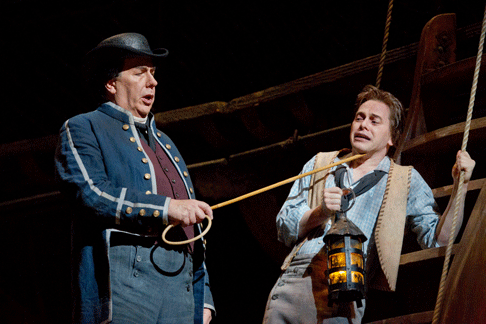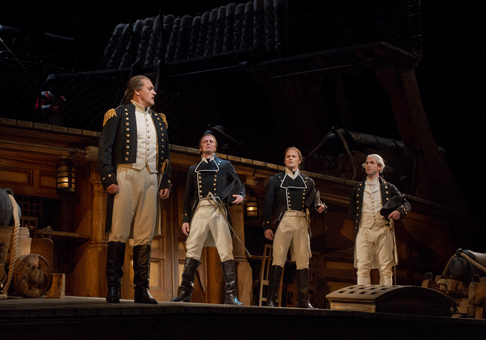19 May 2012
Billy Budd — Metropolitan Opera
The Met saved the best of the season for the end of it, revivals of their first-rate productions of two twentieth-century masterpieces, Jánaček’s Makropoulos Case and Britten’s Billy Budd.

The Met saved the best of the season for the end of it, revivals of their first-rate productions of two twentieth-century masterpieces, Jánaček’s Makropoulos Case and Britten’s Billy Budd.
New Yorkers have been preparing for this all season—longer in the case of Karita Mattila’s Emilia Marty, a role she undertook for the first time only last autumn in San Francisco. The Met’s production, designed to showcase Jessye Norman’s majestic figure and presence, may not quite suit Mattila’s more athletic performing style and Nordic looks (neither of them seems especially Greek, the nationality of Elina Makropoulos), but the mating of Jánaček and Mattila is very near ideal, and if she no longer sounds like the young, idealistic Jenufa or Katya Kabanova, well, Elina/Emilia is 337 and should give some evidence of wear and tear. It was a thrilling occasion, and the Met surrounded her with a fine supporting cast led by Jiří Bělohlávek, perhaps the finest conductor of Jánaček since Sir Charles Mackerras.
John Dexter’s production of Billy Budd is always welcome. This is one of the rare occasions a producer has made proper use of the size and proportions of the Met stage, its stage machinery and its lighting effects, filling it without crushing the life out of the human beings singing the drama, everything in proportion, with an excitement that suits the composer’s intentions at every turn. Dexter also achieved this sublime match of score and production in his far simpler (and cheaper to mount) version of another masterpiece of the 1950s, Poulenc’s Les Dialogues des Carmelites, which will return next season. In Billy, the crowded cast has no problem staying out of each other’s way and William Dudley’s multi-leveled ship rises and descends noiselessly, highlighting the confrontations and interactions necessary to the plot—as Scott Pask’s sets for John Doyle’s production of Peter Grimes so conspicuously failed to do.
I had not noticed before that Dudley’s costume for Billy, a gleaming white, highlights him against the dirtier or grayer costumes of the other sailors, in or out of the spotlight. No matter what else is going on, we always know where Billy is and what he is doing—and, importantly for a hero unjustly accused of crime, what he has not done. It has also never been clearer to me that Billy is something of a Savior figure here for the deeply Christian Britten, his goodness and beauty calling immediately to the goodness in every other character and arousing the furious hate (and, one naturally guesses, unassuageable lust) of the evil one, Claggart. Captain Vere’s regret that he did not devise some way to save Billy is a link, in Britten’s view, to the Fall of Man through inaction to prevent evil.
 James Morris as Claggart and Keith Jameson as the Novice
James Morris as Claggart and Keith Jameson as the Novice
Billy Budd is a grand opera (the second of Britten’s three) composed in the manner of a chamber setting, with each instrument set conspicuously separate rather than the romantic, sensuous, string-heavy texture of turn-of-the-century opera. Actions are accompanied by twittering figures for flute, keening figures for saxophone, outbursts for brasses in astringent combinations, tidal cellos and basses under the great tragic meditations. Even the all-male chorus seems to bring light, instrumental color to the story rather than the choral mass we expect of a nautical story, such that their wordless, gut-deep reaction to Billy’s unjust execution seems to come from a surprising emotional place, a place the story has not yet explored, that we had not thought Britten would explore. We are shocked and impotent at the crime, just as the sailors are, just as we are intended to be; we are drawn into the tale, unable to be mere spectators to it.
Billy Budd is a very personal work, the creation of a Christian, a homosexual, a pacifist and an ironist. An artist who was not all these things could not have done justice to the moral clarity and the absence of clarity in Melville’s tale. Claggart’s credo is modeled on that of Verdi’s Iago, whose “motiveless malignity” seems to emerge from a sheer love of the power to do harm. Nothing Iago tells us of his reasons to hate Otello (and he never suggests any personal dislike of Desdemona, his tool to destroy her husband)
Britten’s pacifism is the message of the great war scene when the sailors (and those hearing and watching them) are thrilled by the great action after inaction, a “stock” war scene from so many grand operas—only to have the enemy escape after a single shot is fired and the heavily symbolic mist closes in, frustrating everyone but the evil Claggart, whose trap for Billy can now be sprung. We are meant to take the fog, the confusion, as the moral mess of any mob howling for the blood of strangers. That none of these simple sailors lost in a moral fog gets quite what he bargained for in the scenes that follow the thrilling buildup is Britten the ironist and moralist, whose bitter settings of Wilfred Owen’s poetry would soon enhance his setting of the Requiem text for the inauguration of the reconstructed Coventry Cathedral.
 John Daszak as Captain Vere, Dwayne Croft as Mr. Redburn, Ryan McKinny as Mr. Ratcliffe, and Kyle Ketelsen as Mr. Flint
John Daszak as Captain Vere, Dwayne Croft as Mr. Redburn, Ryan McKinny as Mr. Ratcliffe, and Kyle Ketelsen as Mr. Flint
In the current Met run, Nathan Gunn, a singer of little subtlety and a rather crooning style more appropriate to old Broadway than to opera, takes on the role of Billy for the first time at the Met. After a gruff opening scene, he inhabits the “handsome sailor’s” naïve physicality, dancing, fighting, suspecting no evil, grateful for (and inclined to return) everyone’s affection. His resigned final monologue was his most moving work, though his diction was sometimes indistinct. Claggart is a role that has long belonged to James Morris at the Met, but his voice has dried out considerably and the sensuous menace he used to suggest has faded with it. John Daszak, an English tenor, made his company debut as Vere, too weak to respond to Billy’s plea to for salvation and insufficiently ruthless to suppress his doubts. In the monologues that open and close the opera Daszak’s every word rang clear. He was also visibly shaken at having to preside over Billy’s execution.
The opera’s many smaller roles were ably filled by both old-timers and newcomers. Veteran John Cheek was a delight as the Dansker; Dwayne Croft (a sometime Billy) and Kyle Ketelsen excellent as Captain Vere’s supporting officers; Allan Glassman and Mark Schowalter did good work as Billy’s fellow impressed seamen. Scott Scully as the treacherous Squeak and Scott Jameson as the self-hating Novice sang beautifully and were riveting in their scenes of corruption and weakness.
There is something very satisfying about attending so familiar a production of so intriguing an opera and knowing from the first mysterious notes that all will go well, that the opera is right for the stage, that the staging is right for the opera, that the performers are itching to get at our ears and eyes and hearts, as the sailors in the great “This is the moment” set piece are itching to get at the French enemy. I almost envy those who came to Billy Budd not knowing the opera or the production and were astonished by its excitement.
John Yohalem